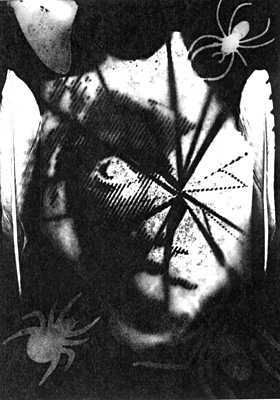All Nonfiction
- Bullying
- Books
- Academic
- Author Interviews
- Celebrity interviews
- College Articles
- College Essays
- Educator of the Year
- Heroes
- Interviews
- Memoir
- Personal Experience
- Sports
- Travel & Culture
All Opinions
- Bullying
- Current Events / Politics
- Discrimination
- Drugs / Alcohol / Smoking
- Entertainment / Celebrities
- Environment
- Love / Relationships
- Movies / Music / TV
- Pop Culture / Trends
- School / College
- Social Issues / Civics
- Spirituality / Religion
- Sports / Hobbies
All Hot Topics
- Bullying
- Community Service
- Environment
- Health
- Letters to the Editor
- Pride & Prejudice
- What Matters
- Back
Summer Guide
- Program Links
- Program Reviews
- Back
College Guide
- College Links
- College Reviews
- College Essays
- College Articles
- Back
The Eighth Birthday MAG
Asa child, I often avoided confrontation by keeping my opinions to myself, nomatter how offensive someone was. But when someone directed negative commentstoward my autistic brother who could not defend himself, I lost my self-control.Witnessing the struggles Bo has gone through, I feel it is cruel and ignominiousto belittle the battles children deal with daily. I share this story to helpdisclose the need to treat others with the courtesy we all deserve.
Inever felt embarrassed by Bo or his condition. I describe him as "one coolcat." I have never encountered anyone who can use a computer with suchefficiency, remember a week's entire TV show schedule, or quote all the linesfrom "Ren and Stimpy." Bo, the technology wizard of our family, canhelp us with any computer-related problem.
But Bo also has acommunication barrier; he has difficulty carrying on a "normal"conversation with a "normal" child. This never blocked communicationbetween my beloved brother and me; I jumped at the challenge of deciphering the"Bo Language."
When faced with someone unfamiliar with hisbehavior, however, I often became defensive. I too often missed chances to exposeto others the need to give those with disabilities equal treatment, or at least afriendly smile. Instead, I would snap at the person committing the mistreatment;I would bristle and sputter and claw defensively like an angry cat.
Oncewhen I was in my defensive mode, I had the opportunity to teach others theimportance of treating the disabled with respect.
It was Bo's birthday.While other eight-year-olds would be celebrating with parties at Chuck E. Cheeseor a roller rink, Bo wanted to visit his favorite place - the library, which isgigantic, with rows and rows of books and movies and tapes. Bo chose the mostcolorful, delightful corner of the building, a corner where beanbags and toys andanimal crackers accompanied the readers as they traveled far away on magiccarpets, danced with Indian princesses, or fought fierce dragons. Bo loved thechildren's section.
On this particular day, a group of girls hadclambered in, giggling and talking about boys and whispering about "Suzy'snew haircut." Growing tired of teasing those poor souls, they targetedanother person: my brother. When I raced to the children's corner to show Bo thelatest issue of Sesame Street magazine, I witnessed the laughing sneers the girlsdirected at Bo.
"Hey, kid, aren't you a little old to be readingHop on Pop?"
When my brother distractedly replied,"Uh-huh," and continued reading, the other girl rolled her eyes,chuckled, and replied, "You retard."
The magazine fell from myhands as I marched over and slapped her on the arm. A red handprint swelled onher pale arm, and the girl stared, stunned. I braced myself for the abuse I wouldinevitably receive, but, to my surprise, she just stared. I defended my actionsby saying, "You called my brother a retard. He is autistic, and it is hisbirthday, and if he likes Hop on Pop, then ..."
Large round tearswelled up in the girl's eyes, and slid down her freckled nose. Shocked, I gazedat her, searching her tear-filled eyes for a sign of compassion or remorse. Had Istruck the girl that forcefully, or was she crying because she felt sorry for herwords? Finally the girl burst into tears of shame and shock. She sobbed, "Iam so sorry! I ... I didn't know ... I didn't mean ... I'm so terrible!" Iimmediately comforted her, telling her that we forgave her.
"I'm justasking you to treat Bo with the same respect you would treat any other humanbeing. Though he acts a little differently, he has feelings and a brain and aheart, just like you," I replied.
My ever-thoughtful brothercompassionately walked over and shamelessly kissed the girl on the cheek,comforting her with, "Don't cry, little girl."
The girltearfully embraced Bo and offered him an apology. Bo giggled, "Here, littlegirl, read this," he offered, handing her a copy of The Foot Book, one ofBo's favorites. Over Dr. Seuss books, animal crackers and Dixie cups filled withapple juice, the two girls, my brother, and I laughed and talked, enjoying thefeeling of overcoming prejudices and finding a common ground: a desire to beloved and appreciated.
The two girls teasing my brother made me snap andlose my self-control and patience. Had I simply explained to the girl mybrother's condition and the mistreatment she had directed at Bo, she would havemost likely apologized and learned a valuable lesson without acquiring a purplebruise. But my own shortcomings taught us all a priceless lesson, and allowed thegirls to see the tenderness in my brother that their prejudices had caused themto overlook.
As Dr. Martin Luther King, Jr. once said, "He who isdevoid of the power to forgive is devoid of the power to love.

Similar Articles
JOIN THE DISCUSSION
This article has 0 comments.
